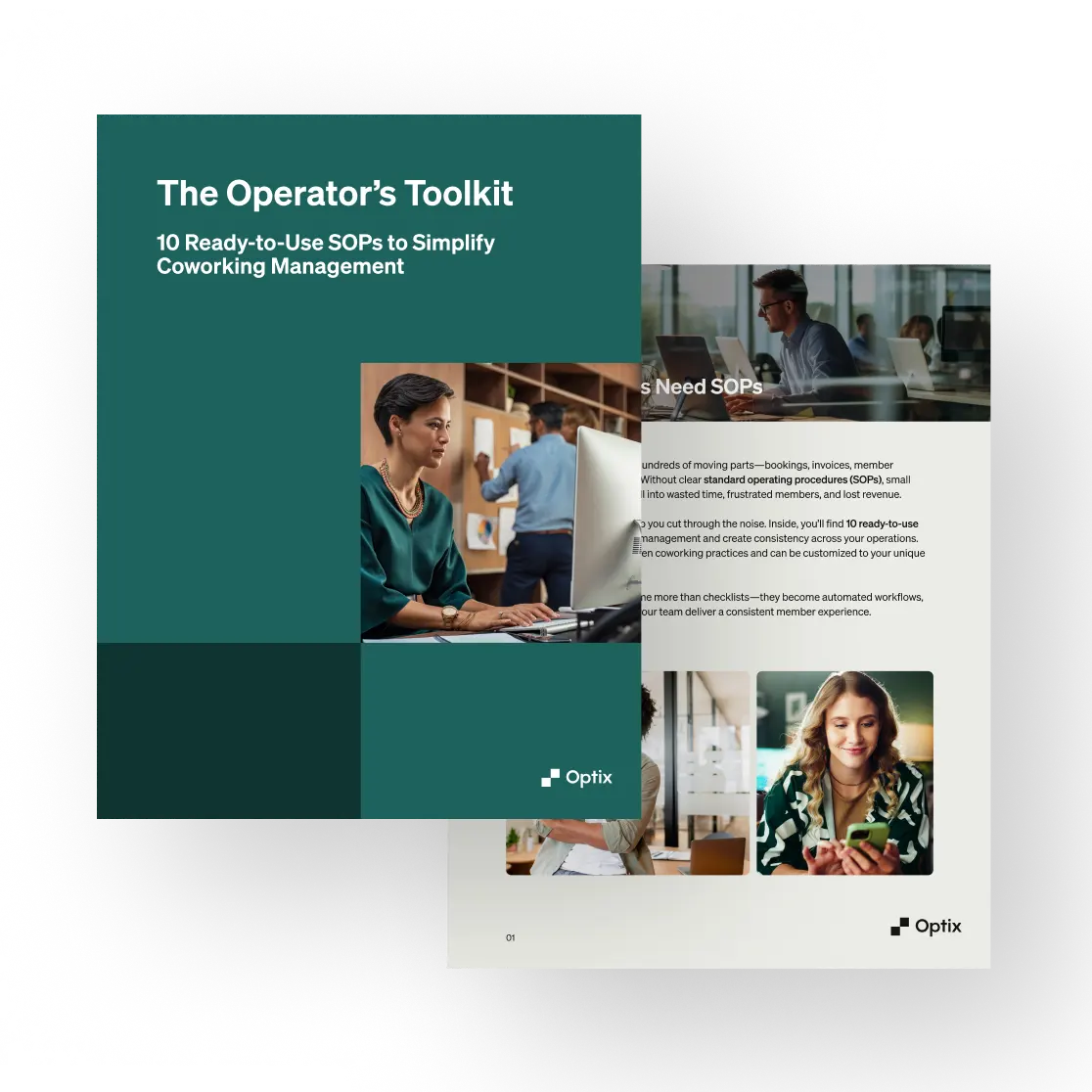
If you’re operating a flex space, whether it’s for wellness professionals or entrepreneurs, chances are, you need a platform to help you manage it all.
Flex space management software is designed to help you automate every aspect of your alternative use space, from billing to booking. With technology handling the mundane day-to-day tasks, you’ll have more time to build community and grow your business.
In this article, we’re breaking down the top eight platforms for managing a flex space in 2025. These platforms consistently come out on top when it comes to running a space — and now, we’re sharing that list with you.
10 Ready-to-Use SOPs to Simplify Coworking Management

The best flex space management software in 2025
Here is a quick summary of the top platforms for flex space and alternative use spaces in 2025:
- Optix
- Spacebring
- Coworks
- Nexudus
- CoWello
- Yardi Kube
- Mindbody
- The Food Corridor
Before we take an in-depth look at each platform, let’s take a look at how we came up with this list.
Methodology and criteria for creating this list
We looked at a number of different factors across each platform to create the list of the top platforms to manage a flex space.
- Customizability and flexibility: how much of the platform can be customized and how flexible and modular is it?
- Ability to serve alternative business models: how well can the platform serve business models outside of a specific niche or industry?
- Positioning within the flex space industry: does the platform position itself as a leader within the flex space industry?
- Feature set: how robust is the feature set?
- Scalability: how well can the platform scale with a business as it grows?
From here, we looked at reviews and customer testimonials of the platform to come up with a composite score for each.
1. Optix
Optix is a coworking and flex space software known for its exceptional user experience and robust automation capabilities. They serve a variety of businesses within the flex space category including golf simulators, salons, shared kitchens, and co-warehousing facilities.

Why it works for flex spaces: Everything in Optix is designed to be modular and flexible. Unlike other coworking software that is specific to rooms and desks, Optix resources can be anything—whether that’s a golf bay, a kitchen counter, or a doctor’s office. The flexibility and customizability of Optix is what makes it a beloved choice for coworking and flex spaces alike.
Standout features
- Automations: offers the ability to automate every aspect of a flex space business, from lead nurture sequences to invoice follow-ups
- White-labeled app: delivers the best white-labeled app in the industry for flex spaces, enabling members to make bookings from their phone
- Web Widgets: allows for drop-in booking of space directly from any website, enabling an e-commerce experience
- Community engagement: offers direct 1:1 messaging, a member directory, community feed, and more to increase engagement
Considerations
- Not suited for fitness classes: because of the structure of the platform, Optix is not suited for use for fitness-based classes
"Optix has helped us accommodate healthcare providers who need on-demand hourly access to our space. They're now able to use the Optix platform to access these rooms."Rachel P. (Optix)
2. Spacebring
Spacebring is a European-based coworking and flex space management software offering a wide range of features and functionality for coworking spaces, flex spaces, and hybrid workspaces.

Why it works for flex spaces: Along with desk and room booking, Spacebring also offers an equipment booking feature that can be used for other miscellaneous resource booking. The tool is simple and flexible enough that it can be used across a variety of industries including beauty coworking spaces and recording studios.
Standout features
- Parking booking: built-in automated parking booking system to easily reserve parking spaces
- Member benefits program: offer built-in member benefits and perks to reward members
- Equipment booking: rent and book equipment of any kind, be it a projector or kitchen equipment
Considerations
- Limited scalability: while well-suited for single location spaces, the simplicity of the Spacebring platform often limits growth overtime
“We love collaborating with Spacebring to maintain our newly opened beauty coworking space.”Liubov K. (Spacebring)
3. Coworks
Coworks is a coworking space management platform that focuses on community-driven spaces in and around the United States. They serve a variety of niche coworking spaces though are limited to serving spaces that offer rooms and desks to rent.

Why it works for flex spaces: Though not quite as flexible as other platforms, Coworks adapts well to the needs of a variety of business models using a room booking system, with features like secure access and community engagement.
Standout features
- Day passes: automate day pass purchases and make it easy for customers to drop-in for the day
- Credits: use credits in lieu of dollars to influence the purchasing habits of customers
- Tour requests: manage tours directly through Coworks and simply the tour booking process for customers
Considerations
- Limited features and functionality: Coworks’ feature set is not nearly as robust compared to other options on the market, so some sacrifices will likely need to be made in terms of capabilities
“Coworks has been a fantastic tool to help manage our space.”Patric M. (Capterra)
4. Nexudus
Nexudus is one of the original coworking and flex space management platforms to hit the market. Based out of the UK, today they serve a number of flex space businesses along with hybrid workspaces and traditional coworking spaces.

Why it works for flex spaces: As a large, robust platform, Nexudus offers the widest variety of features and functionality to fit the needs of flex spaces. This makes them a good choice for flex spaces with unique business models and alternative needs.
Standout features
- Help desk: track reported issues and mark them as resolved within your software
- Tasks and reminders: keep your team updated with regular tasks and reminders
- Deliveries: manage the delivery of packages and other important items to the space automatically
Considerations
- Highly complex with steep learning curve: Nexudus is not a beginner-friendly platform—it’s best suited for enterprise businesses or those who have deep technical experience and a large team for implementation
“Every time I show a solo musician where they can make a booking, see the rehearsal studios, cancel a booking and check how many hours they have left, they're so impressed.”Bakir K. (Nexudus)
5. Yardi Kube
Yardi Kube is the coworking and flex space management software by Yardi, an industry leader in real estate software. With a comprehensive feature set and deep integrations with other Yardi systems, they are best suited for developer-led flex space operations.

Why it works for flex spaces: Though Yardi Kube is unlikely to be the best choice for boutique flex spaces, their commitment to security and their robust feature set makes them a potential option for large flex space operations (5+ locations).
Standout features
- Online marketplace: sell items for your flex space online
- Automated invoicing: automate key aspects of the financial processes in a flex space
- Centralized accounting: as an “all-in-one” ecosystem, Yardi allows for easy integrations with other Yardi systems
Considerations
- Difficult to use at a hefty price tag: much like Nexudus, Yardi Kube’s comprehensive nature makes it difficult to use—and it clocks in at a hefty price tag with non-transparent pricing
“Great for tracking space usage, billing, and service requests.”Alexia F. (Capterra)
6. CoWello
CoWello is a newer coworking and flex space management platform that caters primarily to wellness-focused workspaces and shared workspaces for mental health professionals.

Why it works for flex spaces: While their feature set is limited and the customer base is small, CoWello offers the bare minimum for flex spaces to automate bookings and process payments. For wellness-focused spaces on a tight budget, CoWello could be a good option.
Standout features
- Public directory: showcase who is a member of your community
- Customizable plans: create custom membership plans for users
Considerations
- Lacking features and scalability: CoWello’s lack of features make it difficult to scale with and use long-term
“CoWello really impressed us with their ability to manage spaces under one location.”Deontee G. (CoWello)
7. Mindbody
Mindbody is a booking software used primarily in the fitness and wellness industry for making bookings, paying invoices, and managing accounts. You’re most likely to find Mindbody being used at a yoga studio, hair salon, or day spa to manage daily bookings and payments.

Why it works for flex spaces: Mindbody is the leading management software in the fitness and wellness industry. They are designed to serve the needs of wellness professionals and fitness spaces and micro-gyms better than any other software on the market today.
Standout features
- Staff management: manage the staff in your flex space from one secure platform
- Business reporting: access detailed analytics and easily export reports on your business performance
- Scheduling: quickly schedule in bookings for members and enable members to book for themselves
Considerations
- Limited to the wellness and fitness industry: Mindbody is best suited for (and really only works) for flex spaces that operate in the fitness or wellness industry
“I'd say the scheduling capabilities were fairly intuitive- moving classes from one schedule to the next, cancelling, rescheduling etc was great.”Don D. (Capterra)
8. The Food Corridor
Similar to Mindbody, The Food Corridor is a space management platform built for one specific niche within the flex space industry—shared kitchens. Today, it is the only software specifically designed for the management of shared kitchens.

Why it works for flex spaces: The Food Corridor offers a tailor-made solution for shared kitchens to effectively manage their space. As the only software for kitchens, it has many specialty features not otherwise seen in other flex space management platforms.
Standout features
- Kitchen document tracking: keep track of and store important documents related to the kitchen and those who use it
- Storage management: manage storage space for those within the shared kitchen
- Flexible billing: they offer flexible billing and invoicing to support a variety of needs for their users
Considerations
- Limited to shared kitchens and commissaries: The Food Corridor, while great for some shared kitchens, is limited in its ability to only serve shared kitchens with a very specific business model
"This platform provides the most comprehensive set of tools and services in regards to payment and scheduling that are specific to running an incubator kitchen."Marianne (The Food Corridor)
Which flex space management platform is best for you?
With so many options available, the last step is determining which platform is best for you and your business model.
For those who want a beautifully designed platform built with flexibility in mind, consider Optix. As the leader in flex space management software, Optix can help meet the needs of your business, whether you’re serving doctors, chefs, hair stylists, musicians, artists…the list goes on.
Connect with a member of our team today to learn more about using Optix in your flex space business—we’d love to hear from you!
Try out Optix free for 14 days (no credit card required)
Book a Demo
Marketing Manager
Kelly Karn is the Marketing Manager at Optix coworking software. She's been covering the latest and greatest in the world of coworking for 4 years and is one of the leading voices in coworking content having written over 300 articles. You can find her work on Coworking Insights, Coworking Resources, Allwork.space, DeskMag, GCUC, and (of course) the Optix blog.
Frequently asked questions
Flex space (short for flexible space) is a versatile type of commercial real estate that combines elements of different types of spaces (like offices, coworking areas, storage, or light industrial use) and can adapt to a variety of business needs.
Flex space management software is a tool designed to help operators of flexible workspaces efficiently manage their facilities, resources, memberships, and users.



